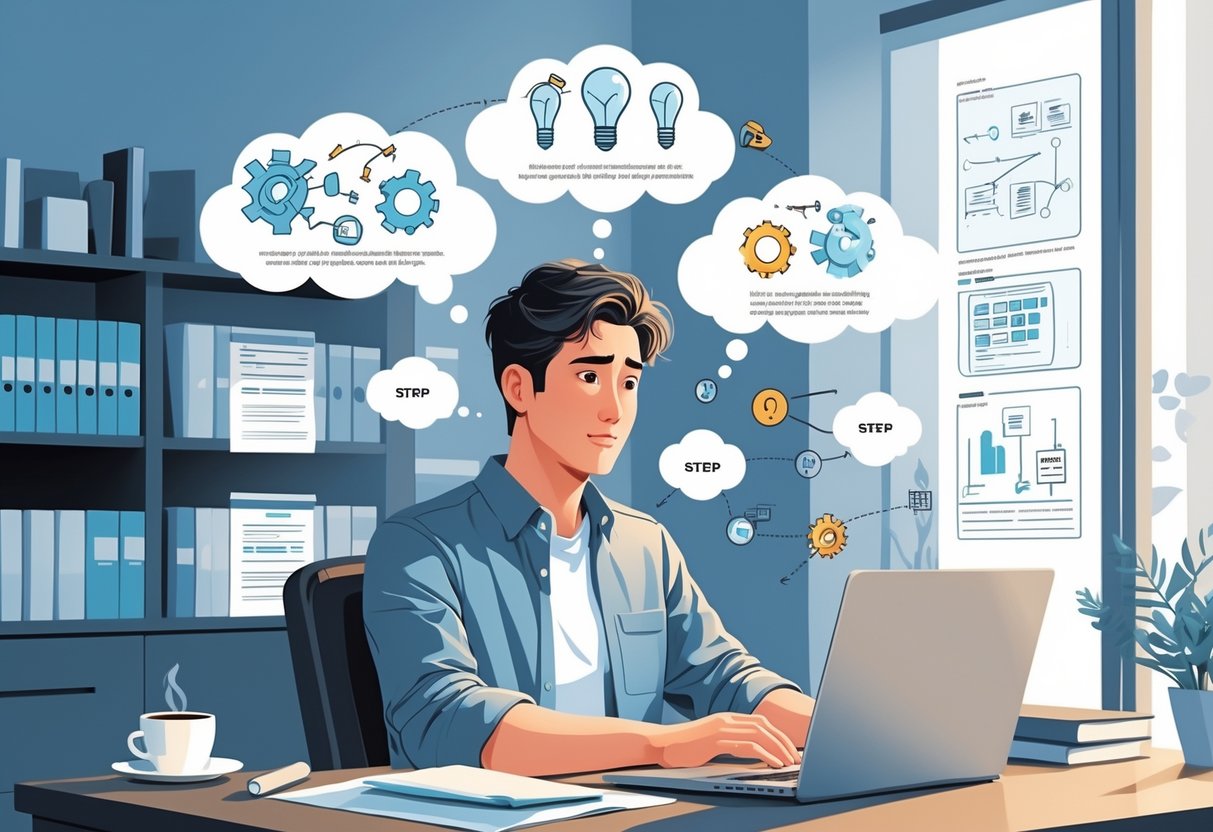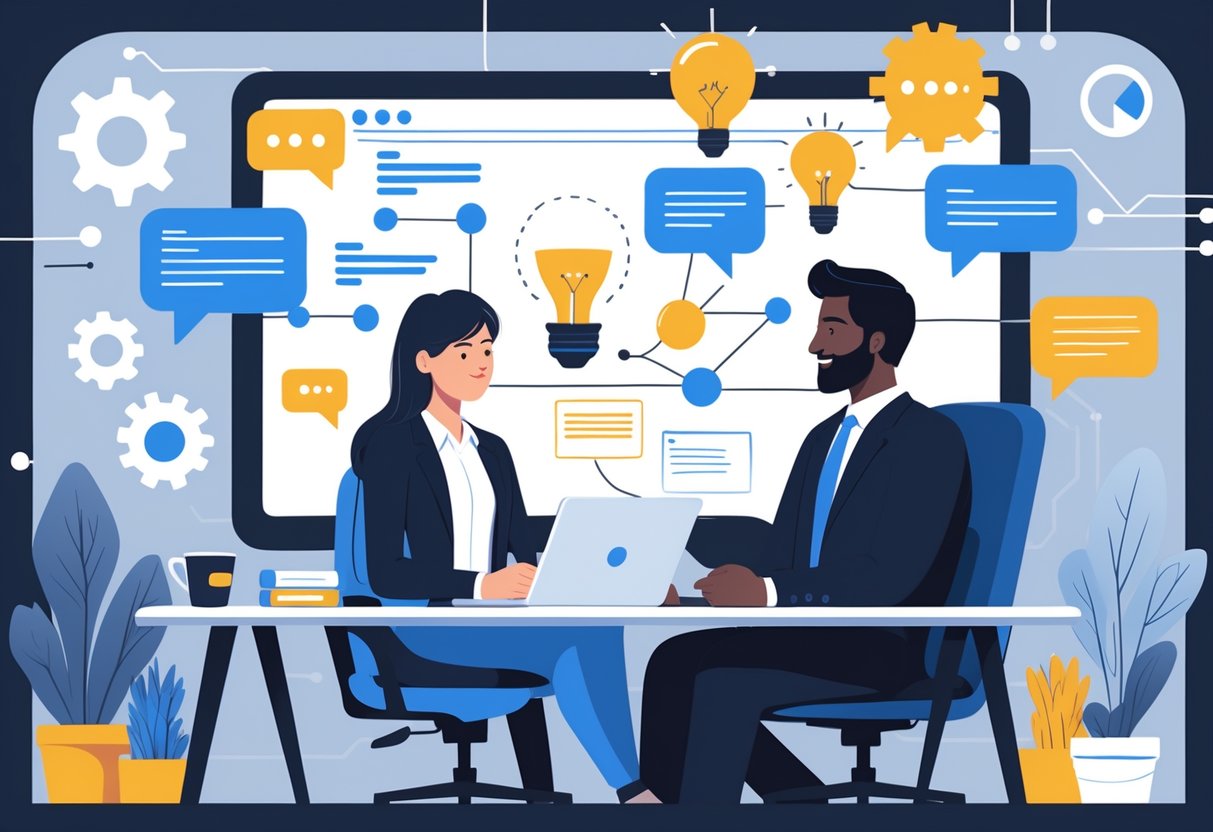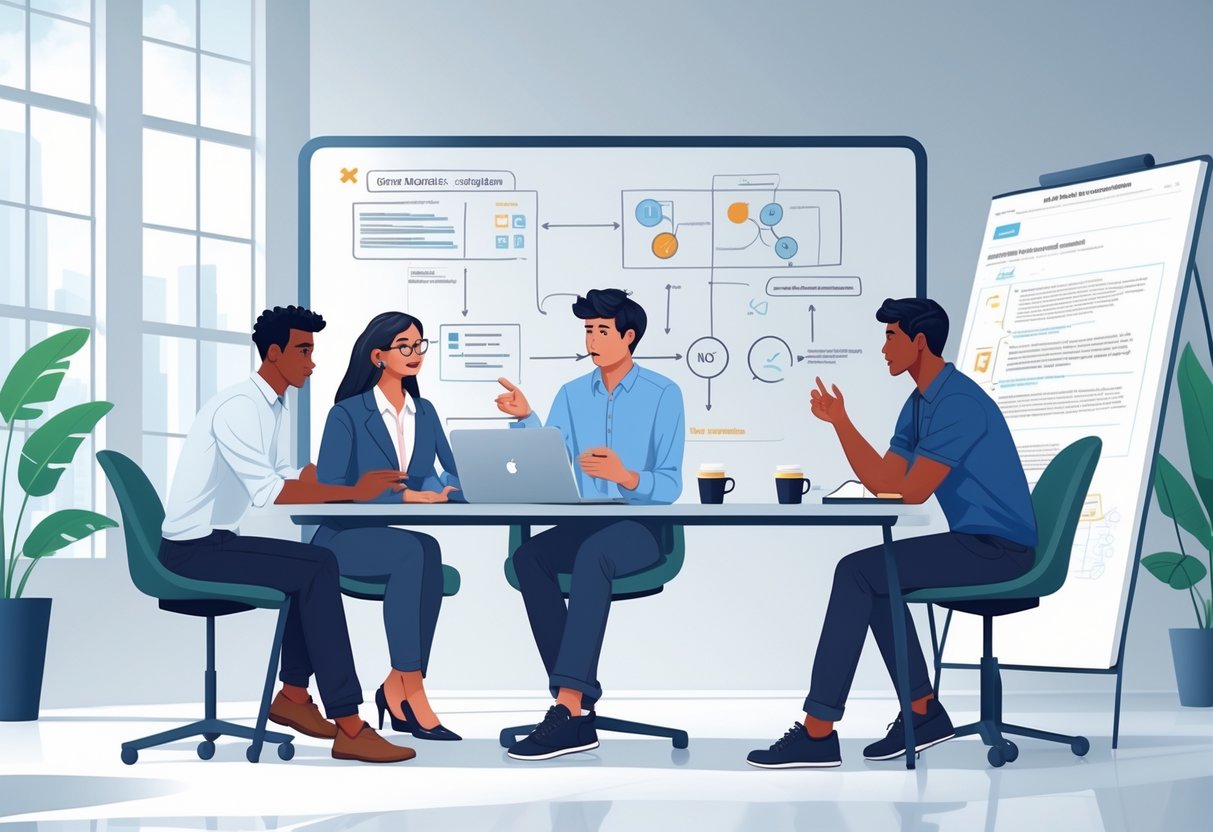Technical interviews can feel overwhelming, but they don’t have to derail a candidate’s career prospects. Many developers experience anxiety when facing coding challenges, algorithm questions, and problem-solving scenarios under pressure. The key lies in understanding that technical interviews should be about demonstrating problem-solving ability rather than performing flawlessly under stress.

The most effective approach involves developing a systematic process for breaking down problems, communicating clearly with interviewers, and maintaining composure when facing unexpected challenges. This structured method helps candidates focus on the technical aspects rather than getting overwhelmed by nerves. Research shows that candidates who follow consistent frameworks perform better than those who dive in without a plan.
Success in technical interviews comes from preparation, practice, and understanding what interviewers actually want to see. Companies evaluate problem-solving skills, communication abilities, and how candidates think through challenges. By learning specific strategies for staying calm, showcasing technical knowledge effectively, and building long-term interview skills, developers can transform these stressful experiences into opportunities to demonstrate their capabilities.
Key Takeaways
- Systematic problem-solving processes help candidates stay focused and organized during challenging technical questions
- Clear communication with interviewers about thought processes is more valuable than finding perfect solutions quickly
- Regular practice and preparation build confidence while reducing anxiety in high-pressure interview situations
Understanding the Nature of Technical Interviews

Technical interviews follow predictable patterns and evaluate multiple skill areas beyond pure coding ability. Most candidates struggle with time pressure, communication expectations, and the multi-layered assessment process that goes far beyond writing correct code.
Common Structures and Expectations
Most technical interviews follow a standard format that includes multiple phases. The process typically begins with introductions and background questions about the candidate’s experience.
Phone/Video Screening usually lasts 30-45 minutes. This stage focuses on basic technical knowledge and cultural fit. Recruiters ask fundamental questions about programming concepts and past projects.
Technical Coding Sessions form the core assessment. Candidates solve 1-3 coding problems within 45-90 minutes. These problems test algorithmic thinking and implementation skills.
System Design Interviews appear in senior roles. Candidates design large-scale systems like social media platforms or messaging services. These sessions last 60-90 minutes and focus on architecture decisions.
Behavioral Components happen throughout the process. Interviewers ask about teamwork, conflict resolution, and past challenges using the STAR method (Situation, Task, Action, Result).
The format varies by company size and role level. Startups might combine multiple stages into one session. Large tech companies often spread interviews across full days with multiple rounds.
How Interviews Assess More Than Coding Skills
Technical interviews evaluate multiple competencies beyond writing functional code. Communication skills rank as highly important as technical ability.
Problem-Solving Approach gets evaluated through verbal explanation. Candidates must explain their thinking process while working through problems. Interviewers want to see structured thinking and logical reasoning.
Code Quality Standards include readable variable names, proper commenting, and efficient algorithms. Clean code demonstrates professional development practices and attention to detail.
Collaboration Skills show through how candidates respond to hints and feedback. Interviewers observe whether candidates ask clarifying questions and incorporate suggestions effectively.
Debugging Abilities reveal troubleshooting skills when code doesn’t work initially. Candidates who systematically identify and fix errors score higher than those who panic or guess randomly.
Technical Communication involves explaining complex concepts in simple terms. This skill becomes crucial for senior roles where teaching and mentoring responsibilities increase significantly.
Typical Challenges Candidates Face
Time pressure creates the biggest obstacle in technical interviews. Many candidates experience anxiety symptoms including rapid heartbeat, sweating, and difficulty concentrating during these high-stakes situations.
Algorithm Recall under stress proves difficult for many developers. Problems that seem simple during practice become challenging when solving them live with an interviewer watching.
Whiteboard Coding eliminates familiar tools like IDE autocomplete and syntax highlighting. Candidates must write syntactically correct code by hand without debugging assistance.
Verbal Processing while coding splits mental resources between problem-solving and explanation. Many developers struggle to articulate their thought process while simultaneously writing complex logic.
Performance Anxiety increases when candidates view interviews as pass/fail tests rather than collaborative discussions. This mindset creates additional pressure that interferes with clear thinking.
Knowledge Gaps become exposed quickly during live coding sessions. Candidates cannot easily research unfamiliar concepts or look up syntax during the interview process.
Staying Calm Under Pressure

Managing stress during technical interviews requires specific techniques to control physical symptoms and maintain clear thinking. The key strategies involve recognizing anxiety patterns, using breathing methods to stay grounded, and developing mental frameworks that promote confidence.
Recognizing and Managing Interview Anxiety
Interview anxiety is a form of performance anxiety that manifests through both physical and mental symptoms. Candidates often experience rapid heartbeat, sweating, trembling, and difficulty concentrating during technical interviews.
The first step involves identifying personal anxiety triggers. Some candidates feel most stressed when asked to code on a whiteboard. Others panic when given algorithmic problems they haven’t seen before.
Common anxiety symptoms include:
- Racing thoughts or mental blanks
- Shaky hands while coding
- Stumbling over explanations
- Second-guessing correct answers
Candidates should practice recognizing these symptoms before they escalate. Early recognition allows for immediate intervention using calming techniques.
Creating a pre-interview routine helps establish control. This might involve reviewing key concepts, doing practice problems, or listening to calming music.
Breathing and Grounding Techniques
Deep breathing serves as the most immediate tool for managing interview stress. The 4-7-8 technique works well: inhaling for 4 seconds, holding for 7 seconds, and exhaling for 8 seconds.
This method activates the parasympathetic nervous system. It slows heart rate and reduces the fight-or-flight response that often occurs during technical interviews.
Grounding techniques help maintain focus:
- 5-4-3-2-1 method: Name 5 things you see, 4 you can touch, 3 you hear, 2 you smell, 1 you taste
- Progressive muscle relaxation: Tense and release muscle groups starting from toes
- Mindful observation: Focus on physical sensations like feet on the floor
Candidates can use these techniques between interview questions. Taking a moment to breathe before answering shows thoughtfulness rather than hesitation.
Building a Positive Mindset
Reframing the interview experience changes how candidates approach technical challenges. Instead of viewing questions as tests of worth, candidates should see them as opportunities to demonstrate problem-solving skills.
Positive self-talk replaces negative thought patterns that fuel anxiety. Rather than thinking “I don’t know this algorithm,” candidates can think “I can work through this step by step.”
Effective mindset shifts include:
- Viewing interviewers as collaborators, not judges
- Treating mistakes as learning opportunities
- Focusing on problem-solving process over perfect answers
- Remembering that thinking aloud shows valuable skills
Visualization techniques help build confidence before technical interviews. Candidates should imagine themselves successfully explaining their thought process and working through coding problems calmly.
Preparing strength-based examples reinforces self-confidence. Candidates should review past projects and accomplishments that demonstrate their technical abilities and problem-solving skills.
Showcasing Your Problem-Solving Process

Candidates who demonstrate their approach to complex problems and explain their thinking clearly stand out in technical interviews. Breaking problems into smaller parts and recovering from mistakes shows real problem-solving abilities.
Breaking Down Complex Problems
Technical interviews often test problem-solving skills through complex challenges that seem overwhelming at first. Candidates should start by reading the problem statement twice to understand requirements fully.
The key strategy involves dividing large problems into smaller, manageable pieces. When faced with a coding challenge, they should identify the main components first. For example, a sorting algorithm problem might break down into input validation, comparison logic, and output formatting.
Effective breakdown techniques include:
- Listing all requirements separately
- Identifying input and output formats
- Finding patterns or similar problems solved before
- Drawing diagrams or flowcharts when helpful
Candidates should verbalize this process during interviews. They might say “I see three main parts here” or “This reminds me of a problem I can solve with recursion.” This shows structured problem-solving abilities that employers value.
The interviewer wants to see logical thinking more than perfect solutions. Taking time to understand the problem completely prevents costly mistakes later.
Demonstrating Your Thought Process
Speaking through the solution step-by-step helps interviewers understand the candidate’s reasoning. They should explain their approach before writing any code or formulas.
Showcasing the thought process effectively means describing why they choose certain methods. Instead of jumping to code, candidates should outline their strategy first.
Key elements to verbalize:
- Why they selected a specific algorithm
- Trade-offs between different approaches
- Time and space complexity considerations
- Edge cases they need to handle
For example, they might explain “I’m choosing a hash map here because it gives us O(1) lookup time, which is better than searching through an array.” This shows deep understanding beyond just knowing syntax.
Candidates should also mention alternative solutions they considered. This demonstrates breadth of knowledge and critical thinking skills. They can say “I thought about using recursion, but iteration will use less memory here.”
The goal is making their problem-solving process transparent and logical.
Handling Mistakes and Recovering Gracefully
Mistakes during technical interviews are normal and expected. How candidates respond to errors reveals their problem-solving abilities under pressure.
When they spot an error, they should acknowledge it calmly. Saying “I notice an issue with my logic here” shows self-awareness. Panicking or getting frustrated sends negative signals to interviewers.
Recovery strategies include:
- Stepping back to review the approach
- Testing with simple examples
- Checking edge cases systematically
- Asking clarifying questions if stuck
Effective problem-solvers use debugging as a chance to show analytical skills. They can walk through their code line by line or trace through with sample inputs.
Candidates should treat mistakes as learning opportunities during the interview. They might say “This error helps me see that I need to handle the empty input case.” This demonstrates growth mindset and adaptability.
The interviewer often provides hints when candidates are stuck. They should listen carefully and incorporate feedback quickly. This shows they can collaborate and take direction well.
Effective Communication in Technical Interviews

Strong communication skills help candidates show their technical knowledge and problem-solving process clearly. Asking good questions, explaining solutions step by step, and staying engaged with the interviewer builds confidence and demonstrates competence.
Clarifying Questions and Requirements
Asking questions demonstrates analytical thinking and shows the candidate takes time to understand problems fully. Good questions prevent misunderstandings and help focus on the right solution.
Candidates should ask about specific requirements before jumping into coding. Questions like “What’s the expected input size?” or “Should I optimize for speed or memory?” show thoughtful planning.
Key clarification areas:
- Input constraints and edge cases
- Performance requirements
- Expected output format
- Available resources or libraries
When faced with unclear requirements, candidates should state their assumptions out loud. This keeps the interviewer informed about their thinking process.
Seeking clarification uncovers hidden details that might change the solution approach. Taking time to ask questions shows attention to detail rather than rushing to code.
Explaining Solutions Clearly
Breaking problems into smaller parts makes complex solutions easier to explain and understand. Candidates should walk through their approach using simple language before writing code.
Starting with pseudocode helps organize thoughts and communicate the plan clearly. This method lets candidates focus on logic without getting stuck on syntax details.
Effective explanation techniques:
- Use simple, everyday language
- Draw diagrams when helpful
- Explain each step’s purpose
- Mention alternative approaches considered
Candidates should test their solutions with examples while explaining their reasoning. This shows debugging skills and helps catch errors early.
Testing with edge cases demonstrates thorough thinking and validates the solution works correctly. Walking through different scenarios out loud keeps the interviewer engaged.
Engaging with Your Interviewer
Active engagement means treating the interview like a collaborative problem-solving session. Candidates should make eye contact, respond to feedback, and adjust their approach based on hints.
Maintaining calm and positive body language shows confidence even when facing difficult problems. Breathing deeply and staying relaxed helps clear thinking.
When stuck, candidates should think out loud about their next steps. Saying “I’m thinking about trying this approach” keeps the conversation flowing.
Engagement strategies:
- Think aloud during problem-solving
- Ask for feedback on approach
- Acknowledge hints and guidance
- Stay positive when facing challenges
Admitting knowledge gaps honestly builds trust with interviewers. Candidates should explain what they do know and how they would learn what they don’t know.
Good candidates show willingness to learn by asking follow-up questions about concepts they haven’t seen before. This demonstrates growth mindset and curiosity.
Critical Thinking and Collaboration Strategies

Technical interviews test more than coding ability – they evaluate how candidates think through problems and work with others. Critical thinking skills and collaboration techniques help candidates demonstrate their complete problem-solving approach.
Applying Critical Thinking Techniques
Candidates should break down complex problems into smaller, manageable parts. This approach shows interviewers how they tackle real-world challenges step by step.
Ask clarifying questions before diving into solutions. Questions about edge cases, constraints, or requirements demonstrate thorough thinking. Most interviewers appreciate when candidates seek clarity rather than making assumptions.
Think out loud during problem-solving. Explaining the reasoning behind each decision helps interviewers understand the thought process. This technique works even when the final answer isn’t perfect.
Consider multiple approaches before choosing one. Discussing different solutions shows flexibility and depth of knowledge. Candidates can explain why they picked one method over another.
Identify potential problems early in the solution process. Pointing out possible issues before they arise shows foresight and planning skills.
Inviting Collaboration and Feedback
Treat the interviewer as a teammate rather than a judge. This mindset creates a more natural conversation and shows collaboration skills.
Ask for input when stuck on a problem. Phrases like “What do you think about this approach?” invite discussion. Most interviewers want to help rather than watch candidates struggle silently.
Listen actively to any hints or suggestions. Building on the interviewer’s feedback shows adaptability and teamwork abilities.
Share alternative ideas and ask which direction seems most promising. This approach demonstrates openness to different perspectives and shows the candidate values others’ opinions.
Acknowledge when the interviewer provides helpful guidance. Simple responses like “That’s a good point” show appreciation for collaboration.
Balancing Technical and Soft Skills
Strong technical knowledge means little without communication skills. Balancing technical and soft skills helps candidates stand out from other applicants.
Explain technical concepts in simple terms. This skill proves the candidate truly understands the material and can work with non-technical team members.
Show patience when the interviewer asks basic questions. Responding kindly to all questions demonstrates good teamwork qualities.
Connect technical solutions to business problems. Explaining how code improvements help users or save money shows broader thinking skills.
Practice active listening during behavioral questions. These questions test soft skills just as much as coding challenges test technical abilities.
Demonstrate problem-solving through both technical expertise and interpersonal skills. The best candidates show they can write good code and work well with others.
Long-Term Growth: Improving Technical Interview Performance

Building strong technical interview skills requires consistent practice and a commitment to learning from each experience. The most successful candidates develop their problem-solving abilities through structured mock sessions and treat every interview as a learning opportunity.
Practicing with Mock Interviews
Mock interviews provide the closest simulation to real technical interview conditions. They help candidates practice explaining their thought process while solving problems under time pressure.
Setting up effective mock sessions:
- Schedule practice interviews with experienced developers or mentors
- Use platforms like Pramp or interviewing.io for structured sessions
- Practice whiteboard coding and system design problems regularly
- Record sessions to review communication patterns and problem-solving approaches
The key benefit is developing comfort with thinking out loud. Many candidates struggle to verbalize their reasoning during actual interviews. Mock sessions build this critical skill.
Focus areas for practice:
- Algorithm implementation under time constraints
- Clear communication of technical concepts
- Handling unexpected questions or challenging problems
- Managing interview stress and maintaining composure
Mock interviews with accountability partners significantly improve performance. Candidates who participate in at least five practice sessions report feeling more confident during real interviews.
Learning from Feedback and Mistakes
Each technical interview provides valuable data for improvement. Smart candidates systematically analyze their performance to identify patterns and growth areas.
Collecting meaningful feedback:
- Request specific feedback from interviewers when possible
- Ask about technical accuracy and communication clarity
- Document questions that caused difficulty
- Note which problem-solving approaches worked best
After each interview, candidates should maintain a detailed log. This includes the types of problems encountered, time management issues, and areas where knowledge gaps became apparent.
Creating improvement plans:
- Identify weak technical areas and create targeted study plans
- Practice specific problem types that caused difficulty
- Work on communication skills if feedback indicates unclear explanations
- Adjust preparation strategies based on interview format feedback
Requesting feedback from interviewers allows candidates to refine their approach. This systematic improvement process leads to stronger performance in future technical interviews.
The most successful candidates treat each interview as part of their professional development. They view rejections as learning opportunities rather than failures.
Frequently Asked Questions
Technical interview anxiety affects most candidates, but specific breathing techniques and mental preparation can reduce panic. Proper study schedules and recovery strategies help candidates regain confidence when interviews don’t go as planned.
What techniques can I use to stay calm during a technical interview?
Deep breathing exercises help candidates control their heart rate during stressful moments. They should take slow breaths in through their nose and out through their mouth when feeling overwhelmed.
Candidates can stay calm by asking clarifying questions before diving into solutions. This gives their brain time to process the problem and reduces rushed mistakes.
Taking a moment to think silently is perfectly acceptable. Interviewers expect candidates to pause and consider their approach rather than immediately start coding.
Positive self-talk helps combat negative thoughts during the interview. Candidates should remind themselves they were invited because the company sees potential in their skills.
How can I prepare effectively to prevent brain freeze in a coding interview?
Regular practice with coding problems builds muscle memory for common patterns. Candidates should solve problems daily rather than cramming everything into a few intense sessions.
Mock interviews with peers or online tools help simulate real interview pressure. This practice reduces the shock of being watched while coding.
Candidates should practice explaining their thought process out loud while solving problems. This skill becomes automatic with repetition and prevents awkward silences during interviews.
Creating a personal cheat sheet of common algorithms and data structures provides quick reference material. Reviewing this sheet before interviews reinforces key concepts.
Is it normal to be scared of technical interviews, and how can I overcome this fear?
Fear of technical interviews is extremely common among developers at all skill levels. Even experienced programmers feel nervous when their abilities are being evaluated under time pressure.
Technical interviews test analytical skills under pressure which naturally creates anxiety. Recognizing this as normal helps candidates feel less isolated in their nervousness.
Gradual exposure through practice interviews reduces fear over time. Candidates should start with low-stakes practice sessions and gradually increase the difficulty and formality.
Reframing the interview as a collaborative problem-solving session rather than a test changes the mental approach. This perspective reduces the feeling of being judged and increases confidence.
What should I do if I feel unprepared for an upcoming technical interview?
Candidates should focus on reviewing fundamental concepts rather than trying to learn new topics. Solid basics often matter more than advanced knowledge during interviews.
They should practice explaining simple concepts clearly and concisely. Interviewers value clear communication as much as technical knowledge.
Reviewing past projects and being ready to discuss them helps candidates feel more confident. Real experience often impresses interviewers more than theoretical knowledge.
Getting adequate sleep and eating well before the interview improves mental performance. Physical preparation supports cognitive function under stress.
What strategies can help me recover if I feel like I’m bombing a technical interview?
Candidates should acknowledge when they’re stuck and ask for hints rather than struggling silently. Interviewers often appreciate honesty and may provide helpful guidance.
Breaking down complex problems into smaller parts can help candidates regain momentum. Even partial solutions demonstrate problem-solving ability.
They should focus on explaining their reasoning clearly, even if the solution isn’t perfect. Interviewers want to understand the candidate’s thought process.
Staying engaged and asking thoughtful questions shows resilience. Candidates who remain curious and collaborative can turn around a difficult situation.
In what ways can I make a positive impression and stand out during a technical interview?
Candidates should explain their thought process before writing code. This demonstrates structured thinking and helps interviewers follow their logic.
Asking about edge cases and potential optimizations shows thorough thinking. Candidates who consider multiple scenarios demonstrate attention to detail.
Writing clean, readable code with meaningful variable names impresses interviewers. Good coding habits shine through even in high-pressure situations.
Showing genuine enthusiasm for the company’s technology stack and challenges creates a positive impression. Candidates should research the company beforehand and ask relevant questions. For general preparation tips, you can also review reputable resources such as Khan Academy’s Computer Science section.




